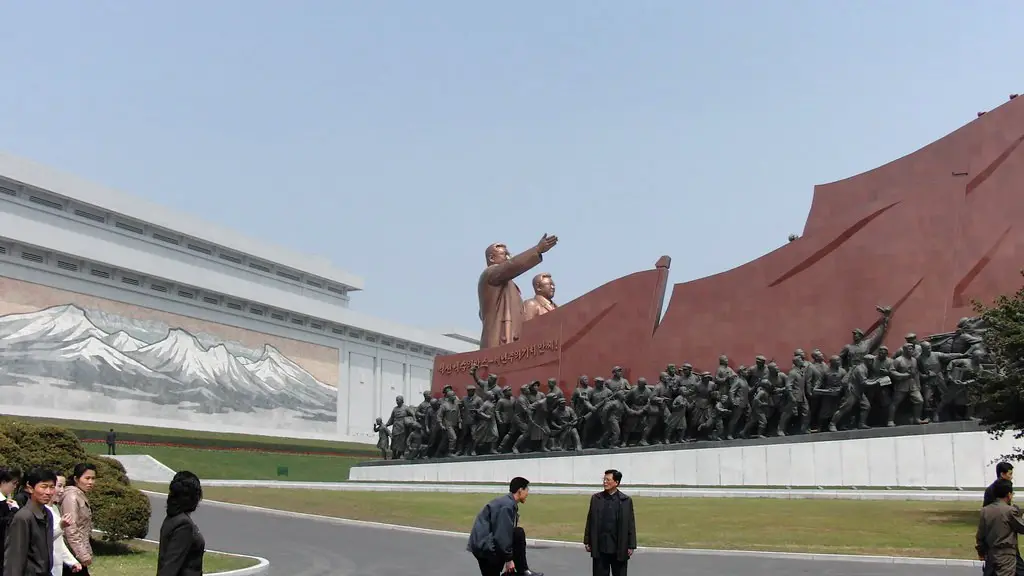The International Impact Of North Korea’s New Direction
North Korea’s 2018 new chapter of foreign relations with the US and South Korea has been a topic of much discussion in recent years. Its new direction is being carefully watched by countries around the world and the international community at large. The reasons for this shift shed light on the significant impact this new direction has on international affairs.
The world has seen the sudden policy shift in North Korea, which coincides with the election of South Korean President Moon Jae-in. After taking office in May 2017, President Moon promised greater engagement with North Korea, aiming to improve their relationship in potentially many different aspects. Consequently, North Korea’s new direction has been focused on constructive dialogue with the US and South Korea in order to reach a comprehensive agreement that addresses their deep mistrust and differences.
This new direction for North Korea is being seen as a positive development that has the potential to contribute to global peace and stability. It has become clear that the US and South Korea are both taking a more diplomatic approach, leading to a more open dialogue with North Korea, which reduces tension in the region. The hope is that this new direction will be successful in ultimately leading to the denuclearisation of North Korea and reduce tension further still.
The economic implications of this new direction are also significant. The improved relationship between the US and North Korea could open up new trade opportunities, allowing North Korea access to the technology, human capital and financial resources necessary to achieve economic stability. This would, in turn, also have a positive impact on South Korea, whose economy is heavily reliant on economic stability in the region.
This new direction is also of particular significance to China, Japan, Russia and other countries in the region. These countries all have a vested interest in seeing a peaceful relationship between the US and North Korea and the stability of the region.
The Challenges Of Maintaining North Korea’s New Direction
North Korea’s new direction is by no means free from challenges. For one, there is the problem of determining how open North Korea will be to any potential agreements and how much it is willing to compromise. North Korea’s unpredictable and often confrontational stance continues to pose a challenge to maintaining its new direction.
Furthermore, North Korea’s new direction is being met with resistance from some US administrations, as well as countries such as Japan, who are concerned that it could lead to the US becoming too lenient with North Korea. This could, in turn, allow North Korea to gain the upper hand and disrupt the peace and stability of the region.
Another challenge is the fact that a comprehensive solution to the denuclearisation of North Korea is yet to be reached, and there is still much disagreement on the matter. North Korea has, so far, rejected the denuclearisation of its entire country, instead focusing on denuclearisation of the Korean peninsula. Finding a comprehensive solution that addresses this difference in view has proven difficult so far.
The Positive Prospects Of North Korea’s New Direction
Despite the challenges faced by North Korea’s new direction, there remain significant positive prospects that this could have on the region.
The improved relationship between the US and North Korea could result in the denuclearisation of North Korea, which could have a positive impact on regional stability and security. It could also have a significant effect on global climate change, which is a pressing issue that has been largely ignored in the region due to the tensions between the two countries.
Furthermore, the improved relations between the US and North Korea could provide the opportunity for the two countries to work together towards the long-term goal of balancing the power of the US and China in the region, as well as to cooperate on potentially contentious global issues, such as North Korean human rights abuses.
The positive prospects of North Korea’s new direction also provide an opportunity for the US and South Korea to pursue other key diplomatic initiatives, such as trade agreements, improved cultural exchanges and better diplomatic representation in the region. This could lead to further cooperation and collaboration between the two countries, as well as a boost to North Korea’s economic prospects.
The Role Of China In North Korea’s New Direction
China is a major player in North Korea’s new direction, and its role is of particular relevance to the nations in the region. China is an important economic partner for North Korea, and has a vested interest in promoting a peaceful and stable relationship between them both.
China is a key advocate of North Korea’s new direction. China has been engaging in a more proactive policy in the region, which has seen it become more involved in negotiations with the US and other nations in the region. This has helped to create a more tranquil environment, pushing North Korea to move towards a more constructive foreign policy.
China’s constructive and positive approach to the region has been seen to encourage North Korea to take positive steps and to build better relationships with the international community. This could, in turn, lead to greater collaboration and understanding between the US, China and North Korea, which would benefit all nations in the region.
Conclusion
It is clear that North Korea’s new direction is having a major impact on international relations, and the international community is closely scrutinising how the situation plays out. North Korea’s shift has the potential to resolve the deep mistrust and differences between the US and North Korea and ultimately lead to the denuclearisation of the entire country, which would have a significant positive impact on regional stability and global security. Furthermore, improved relations between the US, China and North Korea could result in a stronger regional alliance, as well as better trade agreements and more open cultural exchanges, all of which would have a significant positive impact on the economic prospects of the region. However, there are some challenges that must be overcome in order for North Korea’s new direction to be successful, such as the continued willingness of all countries involved to compromise and come to an agreement and the need to address North Korean human rights abuses.
The Effects Of North Korea’s Propaganda On Its New Direction
Though it has yet to be fully seen, there is a good chance that North Korea’s new direction could be heavily influenced by its long-term policy of propaganda. North Korea has long been known for its ability to manipulate the public, both domestically and internationally, by constructing an image of the nation which appeals to the public.
Propaganda is often used to stir public opinion against foreign occupation or to generate a feeling of nationalistic pride. This has long been a tactic of the North Korean government, and it has proven to be extremely effective in swaying public opinion.
It remains to be seen if this new direction will lead to significant changes in North Korea’s domestic and foreign policy. However, it is quite likely that the North Korean government will continue to use propaganda to sway the public in its favour. This could potentially have a significant effect on the success of North Korea’s new direction, as it could be used to generate public support for the nation and viewing its actions in a positive light.
The Role Of International Pressure On North Korea’s New Direction
It is also likely that international pressure will continue to play a role in North Korea’s new direction. International pressure, in the form of economic sanctions and other forms of criticism, has long been used to strategically target North Korea and influence its policies.
For instance, there has been intense international pressure to ensure full denuclearisation of North Korea and the upholding of human rights. This pressure has been building for some time, and it is likely that it will become even more severe in the face of North Korea’s new direction.
The intense international pressure could have a significant effect on North Korea’s new direction. It is possible that the pressure being placed on the nation by the international community could be the pivotal factor in determining whether or not North Korea is successful in its new direction. It is therefore essential that the international community does not ease the pressure on North Korea, but instead works together to ensure that North Korea is held accountable for its policies and actions.
The Potential Of North Korea’s New Direction On Global Security
The potential of North Korea’s new direction on global security is considerable. If it is successful, there is a good chance that it could lead to the denuclearisation of North Korea, as well as increased cooperation between the US, China and North Korea. This could potentially contribute to increased global security, as the international community could work together in preventing nuclear proliferation and the spread of nuclear weapons.
It could also possibly lead to the establishment of an international body that is tasked with the enforcement of international law and ensuring that nuclear weapons are only used as a last resort in any future conflicts. This could be beneficial in preventing and containing future conflict, providing a much-needed source of stability and security in the region.
Furthermore, a successful outcome of North Korea’s new direction could potentially lead to structural and economic reforms in North Korea, leading to greater economic stability and prosperity. This could have a huge effect on the citizens of North Korea, as well as the region, leading to improved living standards and a healthier economy.
Finally, the US and North Korea could work together to improve the human rights situation in the country. This could be achieved through increased foreign aid and the establishment of programs that are focused on civil and political rights, as well as economic and social rights for the citizens of North Korea.


